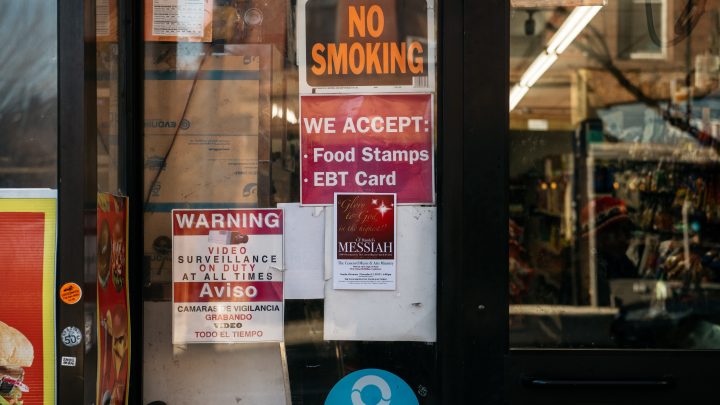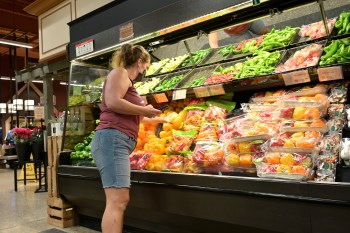
Need SNAP benefits? You may have to wait.

Joanna Jackson has been getting SNAP benefits, or food stamps, ever since her three teenage daughters were small. She knows the process, and she’s used to recertifying multiple times a year.
But this summer she submitted everything for her renewal in July, and then August came and her benefits stopped. She tried reaching out to the SNAP office to find out what was happening.
“I called, wasn’t getting an answer,” said Jackson, 38, who works part time as a community organizer in Albany, Georgia. “I emailed, I didn’t get a response back. I left a voicemail, didn’t get anything back. And then I actually sent a letter, and I didn’t get anything back.”
She also went looking for information on a local Facebook group.
“Other people were complaining that their SNAP was late, that their family was starving, hungry,” she said. “That they felt like the system was behind.”
The system is behind. In Georgia, as of October, about a quarter of new SNAP applications and nearly two thirds of recertification approvals are delayed. For most people, that means it’s taking longer than 30 days to get a decision on their application; for those who qualify for expedited service, it means it’s taking longer than seven days.
It’s not just Georgia.
“Across the country, we’ve seen an uptick in people encountering significant delays,” said Kelly Horton, chief program officer at the Food Research and Action Center. “For many of those applicants, the wait for application approval process feels like being stuck in a never ending traffic jam.”
In more than a dozen states, less than 80% of SNAP applications are being processed on time, according to the most recent data from the USDA, which is from 2022. Before the pandemic, that was only true in one state.
In New York City, “delays are off-the-charts horrible,” said Kathleen Kelleher, a staff attorney at the Legal Aid Society, which has sued the city over the delays. “In thousands of cases people wait more than 60 days, and in a few cases as long as 150 days.”
As recently as 2021, New York City was processing more than 90% of SNAP applications within a month, according to the most recent Mayor’s Management Report. By this year, it was less than 40%.
“If you look back, they used to be able to do this pretty well,” said Abby Biberman, associate director of the public benefits unit at the New York Legal Assistance Group, which sued the city along with Legal Aid.
The agency in charge, the Human Resources Administration, declined an interview, but in an email, a spokesperson attributed the delay in large part to “an historic, absolutely unprecedented increase” in applications in the last couple of years. City officials also say HRA is understaffed, and that that’s contributing to the delays. Officials in other states with backlogs cite similar reasons.
“That to me feels a little bit like, you know, we’ve been dealing with this increase since 2020, and it’s 2023,” Biberman said. “So it feels like at this point the agency has to adjust to this new normal.”
Something that changed more recently and is also part of the problem: a pandemic-era waiver that let people go longer before recertifying has expired.
In Georgia, officials also attribute a large part of the current backlog to an increase in applications the state receives when kids return to school. In 2022, though, the state processed just 68% of applications on time, putting it at the very bottom of the list, nationally.
In an email, a spokesperson for the state Department of Human Services said Georgia is “working tirelessly to eliminate that backlog,” by bringing in more caseworkers, offering overtime, and focusing on older renewals first, among other things.
Around the country, with many people now waiting upwards of two or three months for SNAP benefits to come through, many are relying more on food banks and pantries.
“We’re serving 50% more customers in the last three months than we did at the height of the pandemic,” said Greg Silverman, CEO and executive director of the West Side Campaign Against Hunger, which has a food pantry in New York. “I mean, the numbers are just absurd compared to what they’ve ever been in the past.”
He attributes some of the increase to inflation, and to the large number of migrants that have been coming to the city, but he believes most of it is because of the delays in SNAP benefits.
“I’m having 800 families showing up for food every day at the pantry,” Silverman said, “because the safety net… isn’t getting those benefits to customers in need.”
In Albany, Georgia, Joanna Jackson had to rely on a local food pantry while she was waiting for her SNAP benefits. She also supplemented what she got at the pantry with the cheapest food she could find at dollar stores — canned tuna, soup, spaghetti, things she could make stretch.
After about two months of living like that, Jackson wrote to her senators and her representative in early October.
“When I did that, it’s like I automatically got a response back. I had a pending balance, I would say within the next two weeks,” she said. “I kind of wish I could have thought of that early on.”
By the end of October, she had money in her account again. But she’s still paying back family members who helped her bridge the gap, and the experience of being without money for groceries for so long really affected her, financially, physically, emotionally.
“It made me consider starting my own garden,” she said. “It made me want to go fishing, and I wish I knew how to hunt. You know, it just kind of made me think out of the box.”
It also made her think a lot about policy. Namely, how often families are required to recertify.
“If you have changes in your household, families know to automatically report that,” but otherwise, Jackson said, “it doesn’t feel like they need to have renewals.”
There’s a lot happening in the world. Through it all, Marketplace is here for you.
You rely on Marketplace to break down the world’s events and tell you how it affects you in a fact-based, approachable way. We rely on your financial support to keep making that possible.
Your donation today powers the independent journalism that you rely on. For just $5/month, you can help sustain Marketplace so we can keep reporting on the things that matter to you.

















